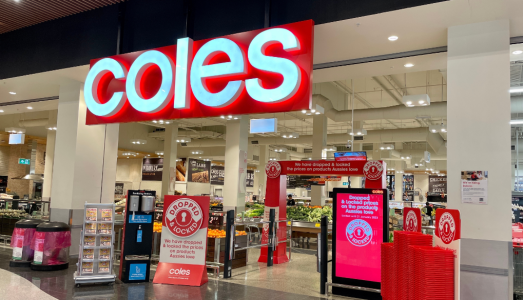Discover why smart shoppers never settle for just this supermarket giant
By
Gian T
- Replies 2
As the cost of living continues to rise in Australia, savvy shoppers are becoming increasingly resourceful in their quest to stretch their dollars further.
A recent revelation by a supermarket giant noted that customers are not just relying on one-stop shopping; they visit up to seven or eight retailers weekly to sniff out the best deals and lowest prices.
Coles chief executive Leah Weckert confirmed that this trend of 'cross-shopping' has become a significant market feature.
Following the release of the company's quarterly results, Weckert highlighted that customers are honing in on specials and are leaning more towards home-branded products to cope with the financial squeeze many are feeling.
The drive to save has remained strong despite Coles reporting deflation in key categories such as meat, dairy, health and beauty, and home care.
'Customers are looking for specials right now,' Weckert said, emphasised the importance of Coles' value proposition and weekly specials in resonating with consumers.
The figures speak for themselves, with Coles reporting a 2.9 per cent increase in sales to the end of September.
The supermarket division, in particular, saw a robust performance, with $9.5 billion in sales, marking a 3.5 per cent growth in-store and a significant 22.4 per cent growth in online sales.
However, liquor sales have yet to fare as well, with no growth in-store and a 1.9 per cent dip in online sales.
Weckert suggested that alcohol is becoming a discretionary expense that customers are willing to cut back on to balance their budgets.
With about two-thirds of customers concerned about their financial stability, a staggering 90 per cent are altering their grocery shopping habits.
'The mortgage is the mortgage,' Weckert explained, but with groceries, there's room to maneuver and make impactful changes to spending.
Despite the trend of shopping around, Coles has noticed that customers are paying more attention to new promotions and loyalty offers.
Coles and Woolworths have seen strong growth in online grocery shopping, with a notable shift towards home brands.
Coles also invests in its brand portfolio, offering affordable options across most categories.
This includes expanding ranges in its 'simply' entry tier and its premium 'finer' range.
This strategy is a response to the increased competition from online giants like Amazon, which has become a formidable competitor in non-grocery items, and other retailers like Bunnings and Chemist Warehouse.
In these challenges, Coles is not resting on its laurels.
The company has announced opening a new $880 million distribution centre in Victoria.
The centre is expected to increase storage capacity by 15 per cent and improve the flow of its supply chain and product availability.
While Coles did not disclose its profit margins, analysts have suggested that the supermarket may be modestly outperforming Woolworths, which recently experienced a share price drop after a profit downgrade.
 How do you find the best grocery deals and decide which stores to visit? Have rising costs changed your shopping habits, and how do you save money? Let us know in the comments below.
How do you find the best grocery deals and decide which stores to visit? Have rising costs changed your shopping habits, and how do you save money? Let us know in the comments below.
A recent revelation by a supermarket giant noted that customers are not just relying on one-stop shopping; they visit up to seven or eight retailers weekly to sniff out the best deals and lowest prices.
Coles chief executive Leah Weckert confirmed that this trend of 'cross-shopping' has become a significant market feature.
Following the release of the company's quarterly results, Weckert highlighted that customers are honing in on specials and are leaning more towards home-branded products to cope with the financial squeeze many are feeling.
The drive to save has remained strong despite Coles reporting deflation in key categories such as meat, dairy, health and beauty, and home care.
'Customers are looking for specials right now,' Weckert said, emphasised the importance of Coles' value proposition and weekly specials in resonating with consumers.
The figures speak for themselves, with Coles reporting a 2.9 per cent increase in sales to the end of September.
The supermarket division, in particular, saw a robust performance, with $9.5 billion in sales, marking a 3.5 per cent growth in-store and a significant 22.4 per cent growth in online sales.
However, liquor sales have yet to fare as well, with no growth in-store and a 1.9 per cent dip in online sales.
Weckert suggested that alcohol is becoming a discretionary expense that customers are willing to cut back on to balance their budgets.
With about two-thirds of customers concerned about their financial stability, a staggering 90 per cent are altering their grocery shopping habits.
'The mortgage is the mortgage,' Weckert explained, but with groceries, there's room to maneuver and make impactful changes to spending.
Despite the trend of shopping around, Coles has noticed that customers are paying more attention to new promotions and loyalty offers.
Coles and Woolworths have seen strong growth in online grocery shopping, with a notable shift towards home brands.
Coles also invests in its brand portfolio, offering affordable options across most categories.
This includes expanding ranges in its 'simply' entry tier and its premium 'finer' range.
This strategy is a response to the increased competition from online giants like Amazon, which has become a formidable competitor in non-grocery items, and other retailers like Bunnings and Chemist Warehouse.
In these challenges, Coles is not resting on its laurels.
The company has announced opening a new $880 million distribution centre in Victoria.
The centre is expected to increase storage capacity by 15 per cent and improve the flow of its supply chain and product availability.
While Coles did not disclose its profit margins, analysts have suggested that the supermarket may be modestly outperforming Woolworths, which recently experienced a share price drop after a profit downgrade.
Key Takeaways
- Coles customers are increasingly shopping around at multiple retailers each week to find the best deals as they navigate Australia's cost-of-living crisis.
- Despite reported deflation in critical categories, people are switching to home-branded products and focusing on weekly specials to save money.
- The supermarket division saw a growth in sales, particularly online, while liquor sales showed no growth, indicating a shift in consumer spending habits due to budgetary constraints.
- Coles is investing in its brand portfolio and has unveiled a new $880 million distribution centre in Victoria to improve supply chain efficiency and meet customer demand.








